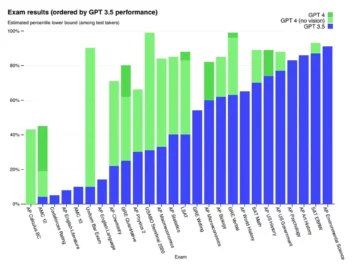Decision intelligence plays a crucial role in modern organizations, enabling them to navigate the intricate and dynamic business landscape of today. By harnessing the power of data and analytics, companies can gain a competitive edge, enhance customer satisfaction, and mitigate risks effectively.
Leveraging a combination of data, analytics, and machine learning, it emerges as a multidisciplinary field that empowers organizations to optimize their decision-making processes. Its applications span across various facets of business, encompassing customer service enhancement, product development streamlining, and robust risk management strategies.

What is decision intelligence?
Decision intelligence is a relatively new field, but it is rapidly gaining popularity. Gartner, a leading research and advisory firm, predicts that by 2023, more than a third of large organizations will have analysts practicing decision intelligence, including decision modeling.
This business model is a combination of several different disciplines, including:
Data science: The process of collecting, cleaning, and analyzing data
Analytics: The process of using data to identify patterns and trends
Machine learning: The process of teaching computers to learn from data and make predictions
These platforms use these disciplines to help organizations make better decisions. These platforms typically provide users with a centralized repository for data, as well as tools for analyzing and visualizing data. They also typically include features for creating and managing decision models.

There are many benefits of having decision intelligence
Decision intelligence can offer a number of benefits to organizations.
Decision intelligence platforms can help organizations make decisions more quickly and accurately by providing them with access to real-time data and insights. This is especially important in today’s fast-paced business world, where organizations need to be able to react to changes in the market or customer behavior quickly.
For example, a retailer might use decision intelligence to track customer behavior in real-time and make adjustments to its inventory levels accordingly. This can help the retailer avoid running out of stock or overstocking products, which can both lead to lost sales.
Artificial intelligence is both Yin and Yang
It also can help organizations make better decisions by providing them with a more holistic view of the data. This is because decision intelligence platforms can analyze large amounts of data from multiple sources, including internal data, external data, and social media data. This allows organizations to see the big picture and make decisions that are more informed and less likely to lead to problems.
A financial services company might use decision intelligence to analyze data on customer demographics, spending habits, and credit history. This information can then be used to make more informed decisions about who to approve for loans and what interest rates to charge.
Utilizing it can help organizations reduce risk by identifying potential problems before they occur. This is because decision intelligence platforms can use machine learning algorithms to identify patterns and trends in data.
Let’s imagine that, a manufacturing company uses decision intelligence to track data on machine performance. If the platform detects a patern of increasing machine failures, the company can take steps to prevent a major breakdown. This can save the company time and money in the long run.

It may help organizations become more efficient by automating decision-making processes. This can free up human resources to focus on more strategic tasks.
For example, a customer service company might use decision intelligence to automate the process of routing customer calls to the appropriate department. This can save the company time and money, and it can also improve the customer experience by ensuring that customers are routed to the right person the first time.
And last but not least, Decision intelligence can help organizations improve customer satisfaction by providing them with a more personalized and relevant customer experience. This is because decision intelligence platforms can use data to track customer preferences and behaviors.
For example, an online retailer might use decision intelligence to recommend products to customers based on their past purchases and browsing history. This can help customers find the products they’re looking for more quickly and easily, which can lead to increased satisfaction.
How to develop decision intelligence?
There are a number of steps that organizations can take to develop decision intelligence capabilities. These steps include:
- Investing in data and analytics: Organizations need to invest in the data and analytics infrastructure that will support decision intelligence. This includes collecting and storing data, cleaning and preparing data, and analyzing data.
- Developing decision models: Organizations need to develop decision models that can be used to make predictions and recommendations. These models can be developed using machine learning algorithms or by using expert knowledge.
- Deploying decision intelligence platforms: Organizations need to deploy these platforms that can be used to manage and execute decision models. These platforms should provide users with a user-friendly interface for interacting with decision models and for making decisions.
- Training employees: Organizations need to train employees on how to use decision intelligence platforms and how to make decisions based on the output of those platforms. This training should cover the basics of data science, analytics, and machine learning.

Automation’s role is vital in decision intelligence
Automation is playing an increasingly important role in decision intelligence. Automation can be used to automate a number of tasks involved in decision-making, such as data collection, data preparation, and model deployment. This can free up human resources to focus on more strategic tasks, such as developing new decision models and managing decision intelligence platforms.
In addition, automation can help to improve the accuracy and consistency of decision-making. By automating tasks that are prone to human error, such as data entry and model validation, automation can help to ensure that decisions are made based on the most accurate and up-to-date data.
Big tech is already familiar with this concept
Decision intelligence is a powerful tool that can be used by organizations of all sizes and in all industries. By providing organizations with access to real-time data, insights, and automation, it can help organizations make faster, more accurate, and more efficient decisions.
Amazon
Amazon uses it to make decisions about product recommendations, pricing, and logistics. For example, Amazon’s recommendation engine uses it to recommend products to customers based on their past purchases and browsing history.
Google uses decision intelligence to make decisions about search results, advertising, and product development. For example, Google’s search algorithm uses decision intelligence to rank search results based on a variety of factors, including the relevance of the results to the query and the quality of the results.
Facebook uses it to make decisions about newsfeed ranking, ad targeting, and user safety. For example, Facebook’s newsfeed ranking algorithm uses decision intelligence to show users the most relevant and interesting content in their newsfeed.

Microsoft
Microsoft utilizes this technology to make decisions about product recommendations, customer support, and fraud detection. For example, Microsoft’s product recommendations engine uses it to recommend products to customers based on their past purchases and browsing history.
Apple
Apple uses this business model to make decisions about product recommendations, app store curation, and fraud detection. For example, Apple’s app store curation team uses it to identify and remove apps that violate the app store guidelines.
Data science and decision intelligence are not related concepts
Data science and decision intelligence are both fields that use data to make better decisions. However, there are some key differences between the two fields.
Data science is a broader field that encompasses the collection, cleaning, analysis, and visualization of data. Data scientists use a variety of tools and techniques to extract insights from data, such as statistical analysis, machine learning, and natural language processing.
Decision intelligence is a more specialized field that focuses on using data to make decisions. Professionals use data science techniques to develop decision models, which are mathematical or statistical models that can be used to make predictions or recommendations. Professionals also work with business stakeholders to understand their decision-making needs and to ensure that decision models are used effectively.
In other words, data science is about understanding data, while decision intelligence is about using data to make decisions.
Here is a table that summarizes the key differences between data science and decision intelligence:
As you can see, data science and decision intelligence are complementary fields. Data science provides the foundation for decision intelligence, but decision intelligence requires an understanding of business needs and the ability to communicate with decision-makers.
In practice, many data scientists also work in decision intelligence roles. This is because data scientists have the skills and experience necessary to develop and use decision models. As the field of decision intelligence continues to grow, we can expect to see even more data scientists working in this area.
Featured image credit: Photo by Google DeepMind on Unsplash.
- SEO Powered Content & PR Distribution. Get Amplified Today.
- PlatoData.Network Vertical Generative Ai. Empower Yourself. Access Here.
- PlatoAiStream. Web3 Intelligence. Knowledge Amplified. Access Here.
- PlatoESG. Automotive / EVs, Carbon, CleanTech, Energy, Environment, Solar, Waste Management. Access Here.
- BlockOffsets. Modernizing Environmental Offset Ownership. Access Here.
- Source: https://dataconomy.com/2023/07/10/what-is-decision-intelligence-definition-and-how-to-develop-it/
- :is
- :not
- :where
- $UP
- 1
- 2023
- a
- ability
- Able
- About
- access
- accordingly
- accuracy
- accurate
- accurately
- across
- Ad
- addition
- adjustments
- Advertising
- advisory
- algorithm
- algorithms
- All
- allows
- already
- also
- amounts
- an
- analysis
- Analysts
- analytics
- analyze
- analyzing
- and
- app
- app store
- Apple
- applications
- appropriate
- approve
- apps
- ARE
- AREA
- AS
- At
- automate
- automating
- Automation
- autopilot
- avoid
- based
- Basics
- BE
- because
- become
- becoming
- been
- before
- behavior
- behaviors
- benefits
- Better
- between
- Big
- Big Picture
- both
- Breakdown
- broader
- Browsing
- business
- business model
- businesses
- but
- by
- CAN
- Can Get
- capabilities
- centralized
- Changes
- charge
- Cleaning
- Collecting
- collection
- combination
- communicate
- Companies
- company
- competitive
- complementary
- computers
- content
- continues
- cover
- Creating
- credit
- crucial
- curation
- customer
- customer behavior
- customer experience
- Customer satisfaction
- Customer Service
- Customer Support
- Customers
- data
- data entry
- Data Preparation
- data science
- decision
- Decision Making
- decision-makers
- decisions
- Demographics
- Department
- deploy
- deployment
- Detection
- develop
- developed
- developing
- Development
- differences
- different
- disciplines
- dynamic
- easily
- Edge
- effectively
- efficient
- emerges
- employees
- empowers
- enabling
- encompasses
- encompassing
- Engine
- enhance
- enjoy
- ensure
- ensuring
- entry
- error
- especially
- Even
- example
- execute
- expect
- experience
- expert
- external
- extract
- facets
- factors
- familiar
- fast-paced
- faster
- Features
- field
- Fields
- financial
- financial services
- financial services company
- Find
- Firm
- First
- first time
- Focus
- focuses
- For
- Foundation
- fraud
- fraud detection
- Free
- from
- Gain
- gaining
- Gartner
- get
- Google’s
- Grow
- guidelines
- habits
- hand
- Harnessing
- Have
- having
- help
- helping
- history
- holistic
- How
- How To
- However
- HTTPS
- human
- Human Resources
- identify
- identifying
- if
- image
- imagine
- important
- improve
- in
- include
- includes
- Including
- increased
- increasing
- increasingly
- industries
- information
- informed
- Infrastructure
- insights
- Intelligence
- interacting
- interest
- Interest Rates
- interesting
- Interface
- internal
- inventory
- Invest
- involved
- IT
- ITS
- journey
- jpg
- Key
- knowledge
- landscape
- language
- large
- Last
- lead
- leading
- LEARN
- learning
- least
- less
- levels
- like
- likely
- Loans
- logistics
- Long
- looking
- lost
- machine
- machine learning
- made
- major
- make
- Making
- manage
- management
- managing
- manufacturing
- many
- Market
- mathematical
- max-width
- May..
- Media
- might
- Mitigate
- model
- modeling
- models
- Modern
- money
- more
- more efficient
- most
- multidisciplinary
- multiple
- Natural
- Natural Language
- Natural Language Processing
- Navigate
- necessary
- Need
- needs
- New
- Newsfeed
- number
- of
- offer
- on
- online
- online retailer
- Optimize
- or
- organizations
- Other
- out
- output
- overstocking
- past
- patterns
- performance
- person
- Personalized
- photo
- picture
- platform
- Platforms
- plato
- Plato Data Intelligence
- PlatoData
- playing
- plays
- popularity
- potential
- power
- powerful
- practice
- Predictions
- Predicts
- preferences
- preparation
- preparing
- prevent
- pricing
- problems
- process
- processes
- processing
- Product
- product development
- Products
- professionals
- provide
- provides
- providing
- purchases
- quality
- quickly
- rank
- Ranking
- rapidly
- Rates
- React
- real-time
- real-time data
- recommend
- Recommendation
- recommendations
- related
- relatively
- relevance
- relevant
- remove
- replacement
- repository
- requires
- research
- Resources
- Results
- retailer
- right
- Risk
- risk management
- risks
- robust
- Role
- roles
- routing
- Run
- running
- runs
- Safety
- sales
- satisfaction
- Save
- Science
- scientists
- Search
- see
- service
- Services
- several
- should
- show
- sizes
- skills
- Social
- social media
- some
- Sources
- span
- specialized
- Spending
- Spending Habits
- stakeholders
- statistical
- Steps
- stock
- store
- Strategic
- strategies
- streamlining
- such
- support
- table
- Take
- targeting
- tasks
- Teaching
- team
- tech
- tech companies
- techniques
- Technology
- than
- that
- The
- The Basics
- their
- Them
- then
- There.
- These
- they
- Third
- this
- those
- time
- to
- today
- today’s
- tool
- tools
- track
- Train
- Training
- Trends
- two
- typically
- understand
- understanding
- up-to-date
- use
- used
- User
- user-friendly
- users
- uses
- using
- utilizes
- Utilizing
- validation
- variety
- various
- View
- visualization
- vital
- we
- WELL
- What
- which
- while
- WHO
- will
- with
- words
- Work
- working
- world
- you
- Your
- zephyrnet












